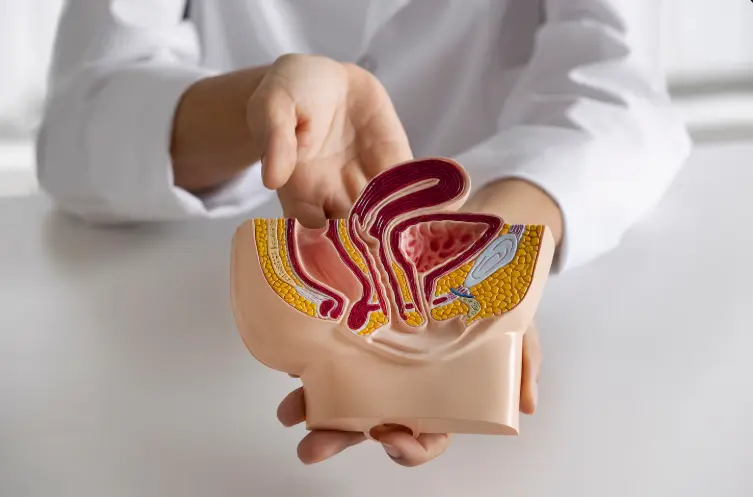Comprehensive Bladder Cancer Treatment
Early detection, expert care, and advanced therapies for better recovery. Trust our multidisciplinary team for world-class bladder cancer treatment.

Bladder cancer
Bladder cancer is a condition where malignant cells form in the tissues of the bladder. It is one of the most common cancers of the urinary tract. Bladder cancer usually starts in the cells lining the bladder, a muscular organ in the lower abdomen that stores urine. Early detection and treatment are crucial for improving the chances of survival.

Early Detection Saves Lives
Early detection and treatment are crucial for improving the chances of survival. If you notice any concerning symptoms, consult a healthcare provider immediately.
Signs and Symptoms
Blood in Urine
Hematuria (blood in the urine) is the most common symptom of bladder cancer. This can appear as pink, red, or dark urine, though it may not always be visible.
Frequent Urination
Feeling the need to urinate frequently, even when the bladder is not full.
Painful Urination
Experiencing pain or a burning sensation while urinating.
Back or Pelvic Pain
This can occur as the cancer grows and spreads.
Fatigue
Feeling unusually tired or weak without a clear cause.
Unexplained Weight Loss
Significant weight loss that is not related to diet or exercise can be a symptom.
Blood in Urine
Hematuria - pink, red, or dark urine, the most common symptom
Frequent Urination
Feeling the need to urinate frequently, even when bladder is not full
Painful Urination
Experiencing pain or burning sensation while urinating
Back or Pelvic Pain
Pain that occurs as the cancer grows and spreads
Unexplained Weight Loss
Significant weight loss not related to diet or exercise
Fatigue
Feeling unusually tired or weak without a clear cause
Important: If you notice any of these symptoms, it is essential to consult a healthcare provider for proper diagnosis and treatment. Early-stage bladder cancer can often be treated effectively, making it crucial to address these signs as soon as they occur.
Meet Our Expert Bladder Cancer Oncologists
Risk Factors
Smoking
Smoking is one of the leading causes of bladder cancer. Chemicals in tobacco smoke can damage the lining of the bladder, increasing the risk.

Gender
Men are at a higher risk of developing bladder cancer than women.

Chronic Bladder Infections or Inflammation
Conditions such as bladder infections and long-term bladder inflammation can increase the risk.

Exposure to Chemicals
Prolonged exposure to certain chemicals, especially those used in the dye industry, rubber production, and chemical manufacturing, increases the risk.

Smoking
Smoking is one of the leading causes of bladder cancer. Chemicals in tobacco smoke can damage the lining of the bladder, increasing the risk.

Gender

Chronic Bladder Infections or Inflammation

Exposure to Chemicals

Bladder cancer
Diet and Nutrition
Prevention
Diagnosis
Key Services
Key Facilities
Best Diet and Nutrition
Proper nutrition plays a vital role in maintaining overall health and may also contribute to cancer prevention. While no specific diet can completely prevent bladder cancer, some dietary habits can help support the immune system and reduce the risk of cancer:
- Antioxidant-rich Foods: Foods rich in antioxidants, such as fruits and vegetables, may help protect the bladder lining from damage. Berries, citrus fruits, and leafy greens are all excellent choices.
- Fiber-rich Foods: A diet high in fiber may contribute to better digestive health and help reduce cancer risks.
- Adequate Hydration: Drinking plenty of water throughout the day helps flush out toxins from the urinary tract and may reduce the risk of bladder cancer.
- Limit Red Meat and Processed Foods: High consumption of red meat and processed foods can increase the risk of several types of cancer, including bladder cancer. Focus on lean protein sources like chicken, fish, and plant-based options.
- Cruciferous Vegetables: Vegetables such as broccoli, cauliflower, and Brussels sprouts contain compounds that have been linked to reduced cancer risks.
Maintaining a balanced diet, staying hydrated, and avoiding known carcinogens are critical steps in reducing the risk of bladder cancer.
While there is no surefire way to prevent bladder cancer, several lifestyle changes can help reduce the risk:
- Quit Smoking: Smoking is the leading cause of bladder cancer. Quitting smoking significantly reduces your risk.
- Avoid Chemical Exposure: If you work in environments with chemicals known to increase the risk of bladder cancer, wear protective gear and follow safety protocols.
- Stay Hydrated: Drink plenty of water daily to help flush out toxins from the urinary system.
- Maintain a Healthy Diet: Follow a diet rich in fruits, vegetables, and whole grains, and limit your intake of processed foods.
- Regular Check-ups: If you have a family history of bladder cancer or other risk factors, regular check-ups and screenings can help detect the disease early, when treatment is most effective.
By incorporating these healthy habits, you can take proactive steps to lower your risk of developing bladder cancer.
Bladder cancer is often diagnosed using a combination of imaging tests, urine tests, and biopsies. Common diagnostic procedures include:
- Urine Tests: A urine sample may be tested for blood, cancerous cells, or markers that indicate the presence of bladder cancer.
- Cystoscopy: This is the primary test used to diagnose bladder cancer. A thin tube with a camera is inserted through the urethra to inspect the bladder.
- Imaging Tests: Ultrasound, CT scans, or MRIs can provide detailed images of the bladder and surrounding tissues to identify tumors or abnormalities.
- Biopsy: If a tumor is found during a cystoscopy, a biopsy may be performed to remove a small sample of tissue for further examination.
These diagnostic methods help determine the size, location, and stage of the cancer, which is crucial for planning the appropriate treatment.
VS Hospitals offers comprehensive cancer care, including specialized treatment for bladder cancer. The key services available include:
- Cancer Screening: Early detection is crucial for successful treatment, and VS Hospitals provides routine screenings for high-risk individuals.
- Surgical Oncology: Surgical treatment options for bladder cancer include partial or full bladder removal (cystectomy), depending on the stage of the cancer.
- Chemotherapy and Immunotherapy: Advanced treatments such as chemotherapy, immunotherapy, and targeted therapy are available to treat bladder cancer effectively.
- Radiotherapy: In some cases, radiotherapy is used to target and shrink tumors in the bladder.
- Palliative Care: For advanced bladder cancer, VS Hospitals offers palliative care services to manage symptoms and improve the quality of life.
VS Hospitals provides state-of-the-art facilities to ensure that every patient receives the best possible care. These facilities include:
- Advanced Diagnostic Equipment: The hospital is equipped with the latest diagnostic technologies, including CT scans, MRIs, and ultrasound machines, ensuring accurate and early detection of bladder cancer.
- Oncology Department: The oncology department at VS Hospitals is staffed by experienced oncologists specializing in the treatment of bladder cancer and other urological cancers.
- Dedicated Cancer Care Units: These units provide specialized care tailored to the needs of cancer patients, including chemotherapy, immunotherapy, and post-surgical care.
- Multidisciplinary Approach: VS Hospitals adopts a multidisciplinary approach to cancer treatment, involving urologists, oncologists, radiologists, and support staff to ensure comprehensive care.
The combination of skilled professionals, cutting-edge technology, and compassionate care makes VS Hospitals a leader in bladder cancer treatment.
Top Medical Facilities at Our Multispeciality Hospital – Here’s What Makes Us Different!
Gain valuable insights from our oncology specialists as they discuss the causes, symptoms, diagnosis, and advanced treatment options for bladder cancer. Understand how early detection and personalized care can make a life-changing difference.
Ready to Begin Your Bladder Cancer Care Journey?
Learn More About Bladder Cancer Care
Frequently Asked Questions
Early symptoms of bladder cancer often include blood in the urine (hematuria), frequent urination, and pain during urination. If any of these signs occur, it’s crucial to seek medical attention promptly to undergo diagnostic testing at VS Hospitals.
Bladder cancer treatment at VS Hospitals includes surgery, chemotherapy, immunotherapy, and radiotherapy, tailored to the stage and type of cancer. A multidisciplinary team ensures that each patient receives the best treatment plan.
Diagnostic tests for bladder cancer at VS Hospitals include urine tests, cystoscopy, imaging scans (CT, MRI), and biopsies. These tests help confirm the diagnosis and determine the cancer’s stage for effective treatment planning.





